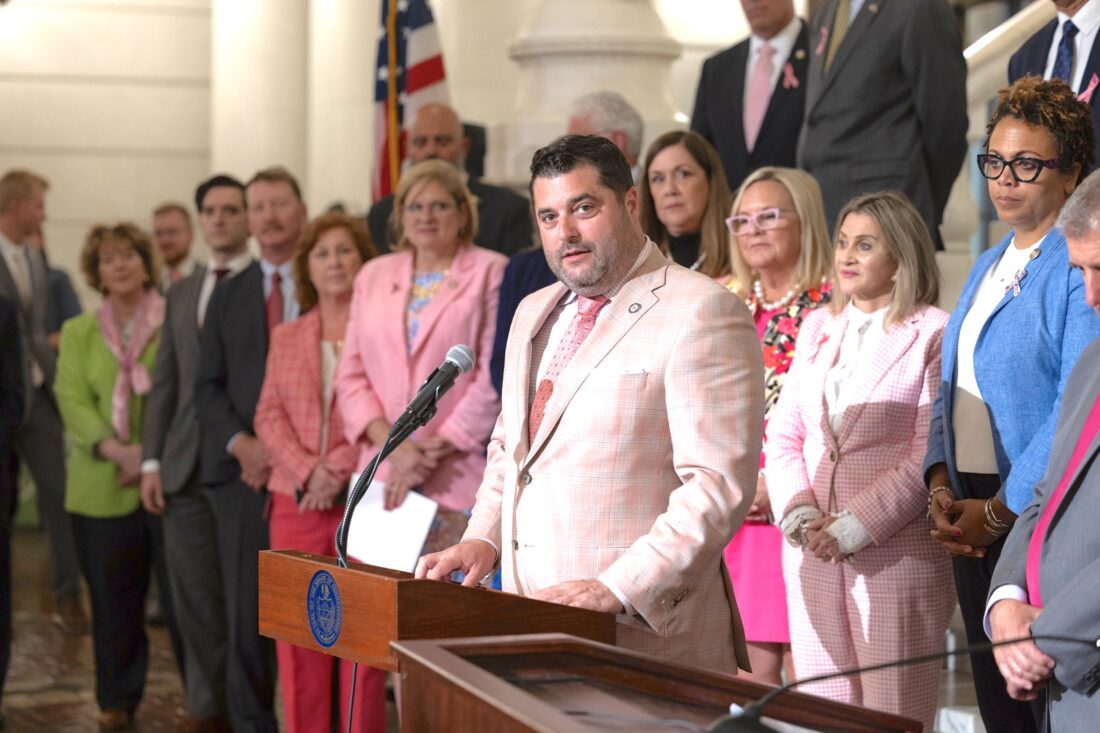New plan for school cell phone ban coming

State Sen. Devlin Robinson, R-Pittsburgh, is leading a new effort to ban cell phones in schools.
State lawmakers could consider a new piece of legislation that would ban cell phones in classrooms.
A school cell phone ban introduced in 2022 by Rep. Anthony DeLuca, D-Pittsburgh, didn’t go anywhere in the state Legislature. Last year, state Sen. Ryan Aument, R-Lititz, circulated a co-sponsorship memorandum for two pieces of legislation that will help remove cell phones from classrooms around the commonwealth, one requiring the use of secure, lockable phone bags in all public schools while the second will create a pilot program for a number of schools to use secure, lockable phone bags purchased through funding provided by the state.
Now, state Sen. Devlin Robinson, R-Pittsburgh; and state Sens. Vincent Hughes, D-Philadelphia, and Steven Santarsiero, D-Doylestown, are circulating a new co-sponsorship memorandum that takes a different approach than DeLuca’s, which sought to implement a program statewide that had been implemented by a school in his district.
Robinson, Hughes and Santarsiero are focusing their bill on studies they say show the negative impact of smartphones on child development. They propose requiring schools to adopt and implement a policy that prohibits the use of phones during the school day, with exceptions made for students with medical conditions or individualized education plans that require the use of a personal communication device.
“Historical data shows a steep decline in mental health in children between 2010-2019 where rates of depression and anxiety rose 50%, the suicide rate for adolescents ages 10-19 rose 48%, while the suicide rate for girls ages 10-14 rose and astonishing 131%,” the lawmakers wrote in their legislative justification. “Just last week, a new study published in the Journal of Human Development and Capabilities found that children who receive smartphones before the age of 13 were significantly more likely to experience serious mental health problems in early adulthood including aggression, emotional instability, and suicidal thoughts. Yet the average age for a child to have a smartphone in Pennsylvania is reportedly 10.5, a number that seems to get younger every year.”
Warren County School District officials announced in September 2024 that the district planned to limit cell phone use by students by limiting use of cell phones and earbuds to passing time, lunch and before and after school.
“During instruction time, cell phone use will not be permitted, except when authorized by a teacher for instructional purposes,” the district said in September. Exceptions will be made for any student with a medical need or assistive technology.
Students are asked to keep their phones in their lockers or at a “location established by each classroom teacher.”
District officials say that any parent looking to reach a child during the school day should call the school office.
If enacted, Pennsylvania would join 27 states in restricting use of cell phones in schools, including New York, Virginia and Florida. School districts in New York have spent part of their summer vacation finalizing new school policies to comply with Gov. Kathy Hochul’s statewide restriction on cell phone use during the school day, something Hochul made a priority in late 2024 and which was passed as part of the state’s 2025-26 state budget. Hochul said during a roundtable discussion with Central New York educators that about half of the state’s school districts have passed such policies ahead of an Aug. 1 deadline.
The Distraction-Free Schools law signed by Governor Hochul requires bell-to-bell smartphone restrictions in K-12 school districts statewide, starting this fall for the 2025-2026 school year. Hochul’s plan prohibits unsanctioned use of smartphones and other internet-enabled personal devices on school grounds in kindergarten through 12th grades for the entire school day (from “bell to bell”), including classroom time and other settings like lunch and study hall periods; allows schools to develop their own plans for storing smartphones during the day; included $13.5 million in funding to be made available for schools that need assistance in purchasing storage solutions to help them go distraction-free; and requires schools to give parents a way to contact their kids during the day when necessary.
It’s a path Robinson, Hughes and Santarsiero want to see Pennsylvania follow.
“A PEW Research Center study found that 72% of US high school teachers say cellphone distraction is a major problem in the classroom,” the lawmaker wrote in their co-sponsorship memorandum. “So it’s no surprise that a 2024 poll from the National Education Association showed 90% of teachers support prohibiting the use of phones during instructional time and 75% support a bell-to-bell ban, which prohibits the use of cellphones from the first bell of the school day until the last bell of the school day. While the Commonwealth has continued to provide financial resources to help students in need of mental health services, we must also target one of the root causes of our children’s mental distress: widespread access to smartphones and social media apps.”



